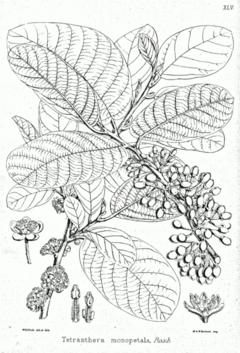| Litsea subsp. var.
|
|

|
| Habit:
|
|
[[Category:]]
|
| Height:
|
⇕
|
to
|
| Width:
|
⇔
|
to
|
|
|
cm
|
|
| Height:
|
⇕
|
cm to The wikipage input value is empty (e.g. <code>SomeProperty::, [[]]</code>) and therefore it cannot be used as a name or as part of a query condition.
|
| Width:
|
⇔
|
The wikipage input value is empty (e.g. <code>SomeProperty::, [[]]</code>) and therefore it cannot be used as a name or as part of a query condition. to The wikipage input value is empty (e.g. <code>SomeProperty::, [[]]</code>) and therefore it cannot be used as a name or as part of a query condition.
|
| Lifespan:
|
⌛
|
|
| Origin:
|
✈
|
|
| Poisonous:
|
☠
|
|
| Bloom:
|
❀
|
|
|
| Exposure:
|
☼
|
|
| Water:
|
◍
|
|
| Features:
|
✓
|
|
| Hidden fields, interally pass variables to right place
|
|
|
| Minimum Temp:
|
☃
|
°F
|
| USDA Zones:
|
|
to
|
| Sunset Zones:
|
|
|
| Flower features:
|
❀
|
|
|
|
|
| Standard Cyclopedia of Horticulture
|
|
Litsea (Japanese name). Lauraceae. Trees or shrubs of little horticultural importance, but may be planted S. Lvs. mostly alternate, coriaceous, usually evergreen: fls. dioecious, small, clustered in umbellike cymes, mostly white or yellow; perianth-tube very short or sometimes ovoid or bell-shaped, the lobes usually 4-6; stamens mostly 6-12: fr. a dry or succulent drupe, on the enlarged perianth-tube. Species perhaps 150 in warm and tropical countries well around the globe, one of them (L. geniculata, Benth. & Hook.) growing in shallow ponds, Ga. to La. Adanson's name, Malapoenna, is rejected by the Vienna or international rules.
The above text is from the Standard Cyclopedia of Horticulture. It may be out of date, but still contains valuable and interesting information which can be incorporated into the remainder of the article. Click on "Collapse" in the header to hide this text.
|
| Litsea {{{status}}} Fossil range: {{{fossil_range}}}
|

Litsea monopetala Illustration
|
| Plant Info
|
| Common name(s):
|
|
{{{common_names}}}
|
| Growth habit:
|
|
{{{growth_habit}}}
|
| Height:
|
⇕
|
{{{high}}}
|
| Width:
|
⇔
|
{{{wide}}}
|
| Lifespan:
|
⌛
|
{{{lifespan}}}
|
| Exposure:
|
☼
|
{{{exposure}}}
|
| Water:
|
☂
|
{{{water}}}
|
| Features:
|
❀
|
{{{features}}}
|
| Poisonous:
|
☠
|
{{{poisonous}}}
|
| Hardiness:
|
❆
|
{{{hardiness}}}
|
| USDA Zones:
|
|
{{{usda_zones}}}
|
| Sunset Zones:
|
|
{{{sunset_zones}}}
|
|
| Scientific classification
|
| Domain:
|
{{{domain}}}
|
| Superkingdom:
|
{{{superregnum}}}
|
| Kingdom:
|
Plantae
|
| Subkingdom:
|
{{{subregnum}}}
|
| Superdivision:
|
{{{superdivisio}}}
|
| Superphylum:
|
{{{superphylum}}}
|
| Division:
|
Magnoliophyta
|
| Phylum:
|
{{{phylum}}}
|
| Subdivision:
|
{{{subdivisio}}}
|
| Subphylum:
|
{{{subphylum}}}
|
| Infraphylum:
|
{{{infraphylum}}}
|
| Microphylum:
|
{{{microphylum}}}
|
| Nanophylum:
|
{{{nanophylum}}}
|
| Superclass:
|
{{{superclassis}}}
|
| Class:
|
Magnoliopsida
|
| Sublass:
|
{{{subclassis}}}
|
| Infraclass:
|
{{{infraclassis}}}
|
| Superorder:
|
{{{superordo}}}
|
| Order:
|
Laurales
|
| Suborder:
|
{{{subordo}}}
|
| Infraorder:
|
{{{infraordo}}}
|
| Superfamily:
|
{{{superfamilia}}}
|
| Family:
|
Lauraceae
|
| Subfamily:
|
{{{subfamilia}}}
|
| Supertribe:
|
{{{supertribus}}}
|
| Tribe:
|
{{{tribus}}}
|
| Subtribe:
|
{{{subtribus}}}
|
| Genus:
|
Litsea
Lam.
|
| Subgenus:
|
{{{subgenus}}}
|
| Section:
|
{{{sectio}}}
|
| Series:
|
{{{series}}}
|
| Species:
|
{{{species}}}
|
| Subspecies:
|
{{{subspecies}}}
|
|
| [[{{{diversity_link}}}|Diversity]]
|
| {{{diversity}}}
|
| Binomial name
|
{{{binomial}}}
|
| Trinomial name
|
{{{trinomial}}}
|
| Type Species
|
{{{type_species}}}
|
| Species
|
200-400, including:
Litsea calicaris
L. cubeba
L. glabrescens
L. glutinosa
L. monopetala
L. stocksii
|
[[Image:{{{range_map}}}|{{{range_map_width}}}|]]
|
| Synonyms
|
| {{{synonyms}}}
|
Litsea is a genus of evergreen or deciduous trees or shrubs belonging to the Laurel family, Lauraceae. The genus includes 200-400 species in tropical and subtropical Asia, Australia, New Zealand, North America to subtropical South America; 70+ species in China, mostly in south and southwest warm regions.
Species
- L. calicaris, Mangeao, New Zealand, a tree reaching 15 m in height with smooth dark greyish brown bark. Opposite leaves, 50-150 mm long, ovate or ovate-oblong, bluish-green below. Flowers small, in umbels of 4-5, drupe oblong-ovoid, 2 mm long, reddish and seated on a disc.
- L. cubeba, evergreen shrub or small tree with lemon-scented leaves and small, pepper-like fruit. The wood is used for furniture, construction,and lumber. The flowers, leaves and fruit are used as medicine and for extracting an essential oil (also called May Chang) used in perfumery.
External links
Template:Fruit-tree-stub

